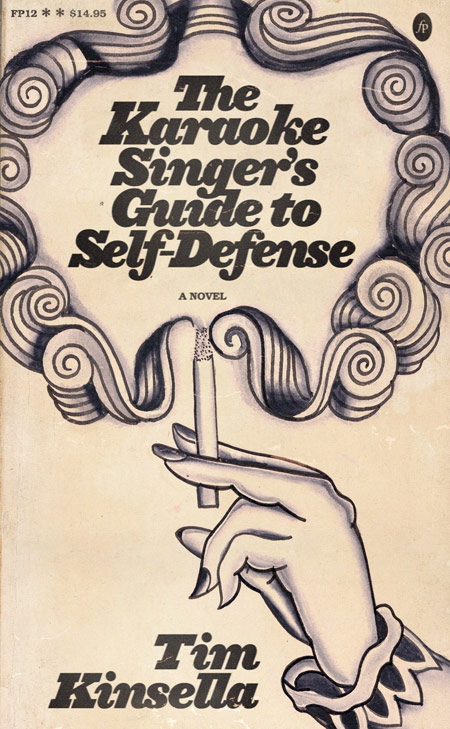
by Tim Kinsella
Featherproof
The characters in The Karaoke Singer’s Guide to Self-Defense are either stuck between the burden of knowledge or the hopelessness of naivete. Delusions abound. Addictions debilitate, but also enable. There’s less in this book to “get” than just to absorb—the ennui, the caring for something that doesn’t matter, or just how to pronounce “karaoke” or properly sing someone else’s song. Kinsella creates a world full of slightly wrong ideals, missed interpretations, and frustration. A funeral attended by siblings whose abusive relationships embody everything wrong with the average American family. A missing father, a stuck-up son ashamed of his mother, a prodigal brother with an addiction to losing bar fights, a sister whose failed pregnancy ruined her career as an exotic dancer. The amount of each character’s shame, so apparent in a vignette about an abandoned child taken in by a Christian xenophobe worried so much about the apocalypse that he never lets the child leave the house, is embodied by this child who naively discovers masturbation and the deep personal shame that comes with it. It’s perverse, but at the same time almost normal in this world. Buildings are abandoned and used for secret bludgeonings. Clothes are soiled and hidden. Sexual assault is committed and accepted with a sigh by the victim. The only successful business in town is the part–strip bar part–karaoke bar that holds the secret key of blackmail over the local officials. A naive, yet idealistic, girl’s first stop off the bus from her former town is to this bar, the Legendary Shhh..., to find work but also to find herself where she doesn’t want to belong.
Kinsella’s book is so busy with subtext that it sometimes struggles to just lay out what is actually happening. He’s Evelyn Waugh on Adderall, so steeped in esoteric reference that the reader needs Wikipedia just to clear up what’s happening, but also so focused on small details—a character cocks a hip here, leans against a wall there, or a “French-Canadian couple choked on constant sobs of laughter in the light of the Coke machine.” The pictures in each scene are so clear and precise that, without looking for subtext, the big picture is nearly lost to the reader. If this were a trait of only a few passages, it would be a problem, but that it consistently runs through the whole book means it is a difficult quality that must be wrestled with in order to take in the whole story. Truthfully, I’m still working on it. This could be a book about an exploded family trying to graft itself back together in light of the loss of the matriarch. This could also be a book about separate, desperately fucked-up people colliding off each other’s learned, inherited, or honed flaws and landing where they may.
When I finished the book, I listened to one of Kinsella’s bands, Cap’n Jazz. One of the leaders of emo in its original sense—loud-quiet-loud, melodic singing, math rock and post-hardcore mixed with confessional, “emotional” singing—Cap’n Jazz in particular was so full of lyrics that it was nearly as difficult as The Karaoke Singer to decipher exactly what was going on. In the song “Puddle Splashers,” Kinsella confesses, “All I’m saying, I wish I had something to say.” He has much so much to say, but to call it “something ” means it should have substance instead of just word vomit. This is, of course, all up to the listener, or reader in the case of The Karaoke Singer’s Guide to Self-Defense. Kinsella puts it all out on the table for us to decipher, almost brazenly daring us to make more (or less) of it than he intends. The book is challenging enough that if your eyes glaze over and you put it down, you will convince yourself to pick it back up if only to find out what sticky, messy life will drift through the amorphous story line next and how it will all tie together.
Michael P. O’Shaughnessy
Orchestral Manoeuvres in the Dark Live Review
The Raincoats Live Review
!!! Live Review
1991: The Year Punk Broke
September Festival Guide
The Jesus Lizard, Club
Retromania
Paul McCartney and The Kills Live Reviews
Mid-Summer Festival Guide
Tedeschi Trucks Band Live Review
Wild Nothing and Twin Sister Live Review
Fungi Girls Live Review
Bob Mould, See a Little Light
Are We Still Rolling?
